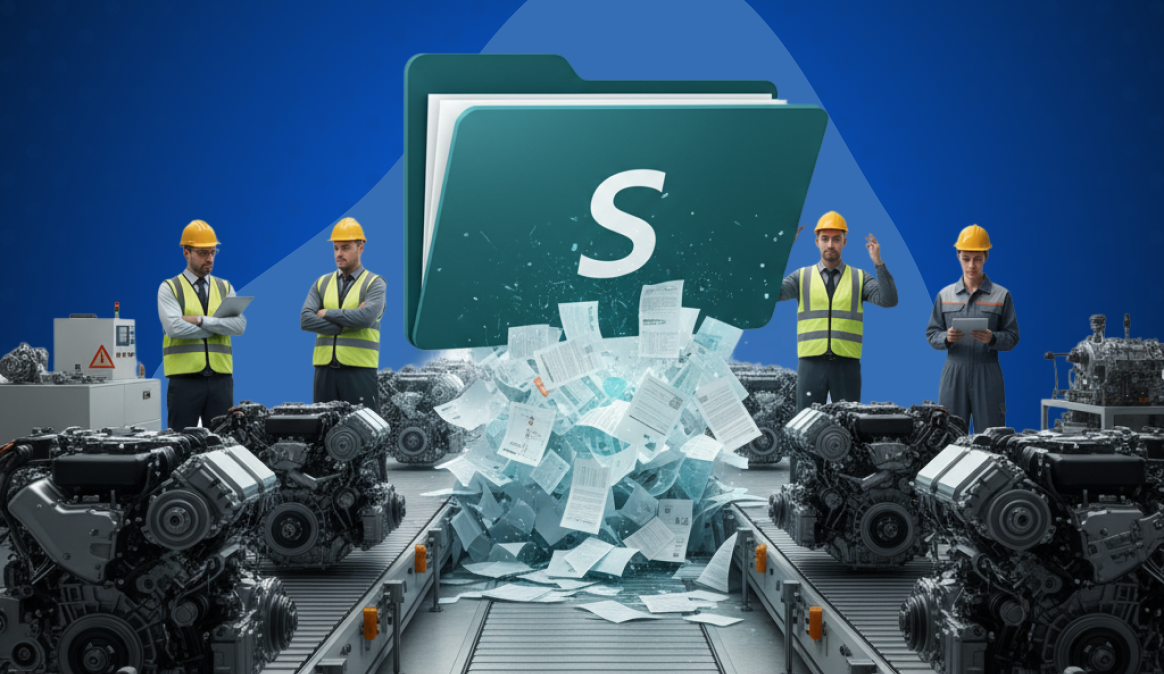In the rigorous domain of automotive manufacturing, adherence to quality management standards like IATF 16949 and ISO 9001 is not merely a compliance requirement but a competitive necessity. These standards dictate a structured approach to quality management, driving organizations to seek robust Quality Management System (QMS) software. Among the array of tools available, Microsoft SharePoint often surfaces as a choice due to its collaborative and document management capabilities. However, upon a closer examination, leveraging SharePoint as a QMS software in the automotive sector poses substantial challenges. Here’s a deep dive into the hurdles faced:
1. Absence of Automotive-centric Features:
Key processes in automotive quality management, such as Advanced Product Quality Planning (APQP) and Production Part Approval Process (PPAP), are indispensable for aligning with standards like IATF 16949 and ISO 9001. Unlike specialized automotive QMS solutions, SharePoint lacks these essential features out-of-the-box, necessitating extensive customization.
2. Complex Customization Roadblocks:
Tailoring SharePoint to meet the specific demands of automotive QMS requirements is a complex endeavor. It often necessitates the engagement of external SharePoint experts, elevating the costs and extending the implementation timeline, which could be particularly detrimental in a fast-paced automotive environment.
3. Inadequate Electronic Signature Capabilities:
The lack of robust electronic signature capabilities within SharePoint hinders efficient document approval and traceability, which are crucial for compliance with IATF 16949 and ISO 9001 standards. This shortfall can lead to substantial compliance risks in processes that require stringent authorization and documentation.
4. Supplier Collaboration Hitches:
Effective collaboration with suppliers, especially concerning Supplier Corrective Action Requests (SCARs), is critical in the automotive sector. SharePoint’s native functionality falls short in fostering seamless communication and data exchange with suppliers, potentially leading to delays and quality discrepancies.
5. Integration Bottlenecks:
A seamless integration with other vital enterprise systems (ERP, MES, etc.) is crucial for achieving a holistic and efficient operational workflow. SharePoint often presents integration challenges due to its proprietary nature, requiring additional customization and consequently further inflating the costs and complexity.
6. Usability and Maintenance Struggles:
Post customization, the usability concerns and the overheads associated with maintaining a heavily customized SharePoint environment become pronounced. Every system update or patch could potentially disrupt customizations, demanding further fine-tuning to restore functionality.
7. Compliance Assurance Challenges:
Ensuring compliance with IATF 16949 and ISO 9001 in a customized SharePoint environment can become a convoluted and risky endeavor. Unlike dedicated QMS software that is designed with compliance at its core, assuring compliance in SharePoint requires a substantial additional effort and vigilance.
In conclusion, while SharePoint stands as a reliable platform for document management and general collaboration, its utility as a QMS software in the automotive sector is considerably hampered. Organizations are likely to find more aligned solutions in dedicated automotive QMS software that offers out-of-the-box functionality tailored to the nuanced demands of automotive quality management. Investing in a specialized QMS software not only aligns better with the industry standards but also paves a smoother path towards achieving automotive excellence.
How Unifize can help
The automotive industry operates within a milieu of stringent quality management standards such as IATF 16949 and ISO 9001. Navigating through these demanding standards requires a Quality Management System (QMS) software that's robust, agile, and specifically tailored for the automotive sector. While platforms like SharePoint offer a broad spectrum of document management and collaboration features, they fall significantly short when it comes to addressing the unique challenges posed by automotive quality management.
This is where a dedicated QMS software like Unifize not only fills the gap but drives organizations towards a trajectory of continuous improvement and compliance. Below, we unravel how Unifize addresses the issues prevalent in SharePoint and elevates the QMS landscape in the automotive sector:
1. Robust Automotive-centric Features:
Unifize is engineered with the automotive industry in mind. It provides out-of-the-box support for key automotive quality processes like Advanced Product Quality Planning (APQP) and Production Part Approval Process (PPAP), ensuring seamless alignment with IATF 16949 and ISO 9001 standards without the need for complex customizations.
2. Seamless Integration:
Integration with other enterprise systems (ERP, MES, etc.) is a breeze with Unifize. Its architecture is designed for easy integration, ensuring a holistic and efficient operational workflow across the organization, sans the integration bottlenecks commonly experienced with SharePoint.
3. Advanced Electronic Signature Capabilities:
Compliance with automotive standards requires a robust mechanism for document approval and traceability. Unifize's advanced electronic signature capabilities ensure that each document goes through the requisite approval channels, maintaining a clear and auditable trail for compliance purposes.


4. Enhanced Supplier Collaboration:
Unifize facilitates seamless collaboration with suppliers, especially in handling Supplier Corrective Action Requests (SCARs). Its intuitive interface and collaborative features ensure that communication and data exchange with suppliers are efficient, timely, and secure.
5. User-friendly and Low Maintenance:
Unifize boasts a user-friendly interface that requires minimal training, encouraging higher user adoption rates. Moreover, its low maintenance nature ensures that IT resources are not drained in managing and fine-tuning the system post-implementation.
6. Simplified Customization:
Unlike SharePoint, Unifize allows for easier customization to meet specific organizational needs, ensuring a faster and cost-effective implementation. This flexibility is instrumental in adapting to evolving processes and industry standards, keeping your organization at the forefront of quality management.

7. Assured Compliance:
With compliance at its core, Unifize simplifies adherence to IATF 16949 and ISO 9001 standards. Its dedicated features for compliance management reduce the complexity and risks associated with ensuring ongoing compliance, making quality management a more streamlined endeavor.
In a nutshell, Unifize emerges as a potent solution for organizations in the automotive sector seeking to elevate their quality management game. Its automotive-centric features, ease of customization, advanced electronic signature capabilities, and seamless integration make it a compelling alternative to SharePoint. By opting for Unifize, automotive organizations not only align better with industry standards but also set the stage for a culture of continuous improvement and operational excellence.




